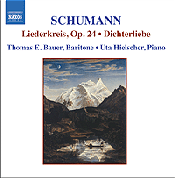The first release includes the cycles Liederkreis, op.24 and Dichterliebe, op. 48, as well as “Der arme Peter” from Schumann’s Romances and Ballades, op. 53 (no. 3), and the song “Belsatzar”, op. 57. Bauer has an engaging sound, and his command of the text is unquestionably solid. Working together, Bauer and Hielscher achieve a remarkably fine balance and convincing interpretation of these two major sets of Lieder. As familiar as the music may be, their approach conveys a freshness often found in live performances that is sometimes difficult to capture on a recording.
Bauer’s voice is natural for Lieder, and his range of expression is well within the scope of the literature selected for this recording. He is sensitive to the poetry, and brings out critical lines, as occurs with the telling treatment of “Schöne Wiege meiner Leiden,” the fifth of Schumann’s Liederkreis, op. 24, with the short utterances and pauses that are appropriate to the text. At the same time, he allows some lines to linger just enough to reinforce the meaning. His tone rings, at times, like a warm cello, and this adds to the ambiance of the performance.
Hielscher’s accompanying is at once discreet and authoritative. She sets a tone in “Warte, warter, wilder Schiffmann,” the next song in the Liederkreis, that allows the singer to open the piece with the necessary brilliance. Her playing reflects a sensitivity that is often extolled, but not always heard. It is welcome here, where the accompanist and the vocalist must unite to present the Lieder as a kind of chamber music. At times the piano must be prominent, but not for the extended passages as occurs with some of Brahms’s Lieder. At some points, the accompaniment requires a full sound that must not overpower the singer, and Hielscher is clearly sensitive to such moments in the score. The give-and-take of these performers is entirely appropriate to these songs, and is borne out in the later set, Schumann’s Dichterliebe, where the accompaniment has a more involved role in that cycle.
The opening song of the Dichterliebe is particularly effective with its tentative, somewhat hovering sense of rhythm that solidifies once the voice enters. Upon entering, Bauer conveys a musing, dreaming quality, which sets the tone for the cycle. This contrasts their more decisive approach to “Ich grolle nicht,” a turning point in the cycle, where the perspective of the narrator shifts, and this is clear in Bauer’s dramatic – and wholly musical – execution of the final strophe. Such definition is evident in the subsequent song and those that follow, and Hielscher confirms that in her approach to the accompaniment, which is prominent without being intrusive. “Das ist ein Flöten und Geigen” has a dance-like quality that suggests in its conclusion the kind of gesture Mahler would use in “Des Antonius Fischpredigt” and some other points in his Wunderhorn settings. (In fact, the couple has released a recording of Mahler’s Lieder, which merits attention for the effective performances it captures.)
“Hör’ ich das Liedchen klingen” retreats from this more extroverted style, allowing the ditty in the title to emerge from the lingering tempo they use to approach this song. From the pacing given to this and the remaining pieces in the cycle, it is clear that Bauer and Hielscher worked out their interpretation of this familiar music, and it is a convincing one. Those who want to hear a fine singer matched with an equally sensitive pianist will enjoy their performance of Schumann’s Dichterliebe. The title “Die alten bösen Lieder” [“The old, bad songs”] is hardly appropriate for this fresh and convincing performance of that song and the entire cycle. For those who wish to hear more from these performers the two additional pieces included on this recording, “Der arme Peter” and “Belsazar,” are worth hearing in Bauer’s interpretation. In these more sustained Lieder, Bauer offers a laudable presentation of the text with his clear diction and sensitivity to both the rhythms of the music and those of the poetry.
In these songs and the others on this CD, the couple demonstrates a masterful approach to Schumann’s Lieder, and they should offer some excellent interpretations in the remainder of his repertoire in subsequent volumes of the series. Already the second volume of the series is announced, and it includes selections from Liebesfruhling, op. 37, “Minnespiel”, op. 101, and Lieder aus Wilhelm Meister, Op. 98a. Given the quality of the first release, the next should be worth hearing, along with the rest of this exciting new edition of Schumann’s Lieder.
While it is not entirely essential when the focus should be on the fine performance, the liner notes are minimal, with the entire insert typeset on two pages. Since this is well-known repertoire by Schumann, it should not be a problem to find texts elsewhere, either by consulting editions of the music or other CDs. Naxos makes texts and translations available at the following URL: www.naxos.com/libretti/schumannlieder1.htm. This is a small concession that should be no means detract from the fine performance found on this recording.
James L. Zychowicz
Madison, Wisconsin
